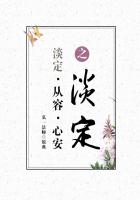This feeling (which we call the moral feeling) is therefore produced simply by reason.It does not serve for the estimation of actions nor for the foundation of the objective moral law itself, but merely as a motive to make this of itself a maxim.But what name could we more suitably apply to this singular feeling which cannot be compared to any pathological feeling? It is of such a peculiar kind that it seems to be at the disposal of reason only, and that pure practical reason.
Respect applies always to persons only- not to things.The latter may arouse inclination, and if they are animals (e.g., horses, dogs, etc.), even love or fear, like the sea, a volcano, a beast of prey;but never respect.Something that comes nearer to this feeling is admiration, and this, as an affection, astonishment, can apply to things also, e.g., lofty mountains, the magnitude, number, and distance of the heavenly bodies, the strength and swiftness of many animals, etc.But all this is not respect.A man also may be an object to me of love, fear, or admiration, even to astonishment, and yet not be an object of respect.His jocose humour, his courage and strength, his power from the rank be has amongst others, may inspire me with sentiments of this kind, but still inner respect for him is wanting.Fontenelle says, "I bow before a great man, but my mind does not bow." I would add, before an humble plain man, in whom Iperceive uprightness of character in a higher degree than I am conscious of in myself,- my mind bows whether I choose it or not, and though I bear my head never so high that he may not forget my superior rank.Why is this? Because his example exhibits to me a law that humbles my self-conceit when I compare it with my conduct: a law, the practicability of obedience to which I see proved by fact before my eyes.Now, I may even be conscious of a like degree of uprightness, and yet the respect remains.For since in man all good is defective, the law made visible by an example still humbles my pride, my standard being furnished by a man whose imperfections, whatever they may be, are not known to me as my own are, and who therefore appears to me in a more favourable light.Respect is a tribute which we cannot refuse to merit, whether we will or not; we may indeed outwardly withhold it, but we cannot help feeling it inwardly.
Respect is so far from being a feeling of pleasure that we only reluctantly give way to it as regards a man.We try to find out something that may lighten the burden of it, some fault to compensate us for the humiliation which such which such an example causes.Even the dead are not always secure from this criticism, especially if their example appears inimitable.Even the moral law itself in its solemn majesty is exposed to this endeavour to save oneself from yielding it respect.Can it be thought that it is for any other reason that we are so ready to reduce it to the level of our familiar inclination, or that it is for any other reason that we all take such trouble to make it out to be the chosen precept of our own interest well understood, but that we want to be free from the deterrent respect which shows us our own unworthiness with such severity? Nevertheless, on the other hand, so little is there pain in it that if once one has laid aside self-conceit and allowed practical influence to that respect, he can never be satisfied with contemplating the majesty of this law, and the soul believes itself elevated in proportion as it sees the holy law elevated above it and its frail nature.No doubt great talents and activity proportioned to them may also occasion respect or an analogous feeling.It is very proper to yield it to them, and then it appears as if this sentiment were the same thing as admiration.But if we look closer we shall observe that it is always uncertain how much of the ability is due to native talent, and how much to diligence in cultivating it.Reason represents it to us as probably the fruit of cultivation, and therefore as meritorious, and this notably reduces our self-conceit, and either casts a reproach on us or urges us to follow such an example in the way that is suitable to us.This respect, then, which we show to such a person (properly speaking, to the law that his example exhibits) is not mere admiration; and this is confirmed also by the fact that when the common run of admirers think they have learned from any source the badness of such a man's character (for instance Voltaire's) they give up all respect for him; whereas the true scholar still feels it at least with regard to his talents, because he is himself engaged in a business and a vocation which make imitation of such a man in some degree a law.















